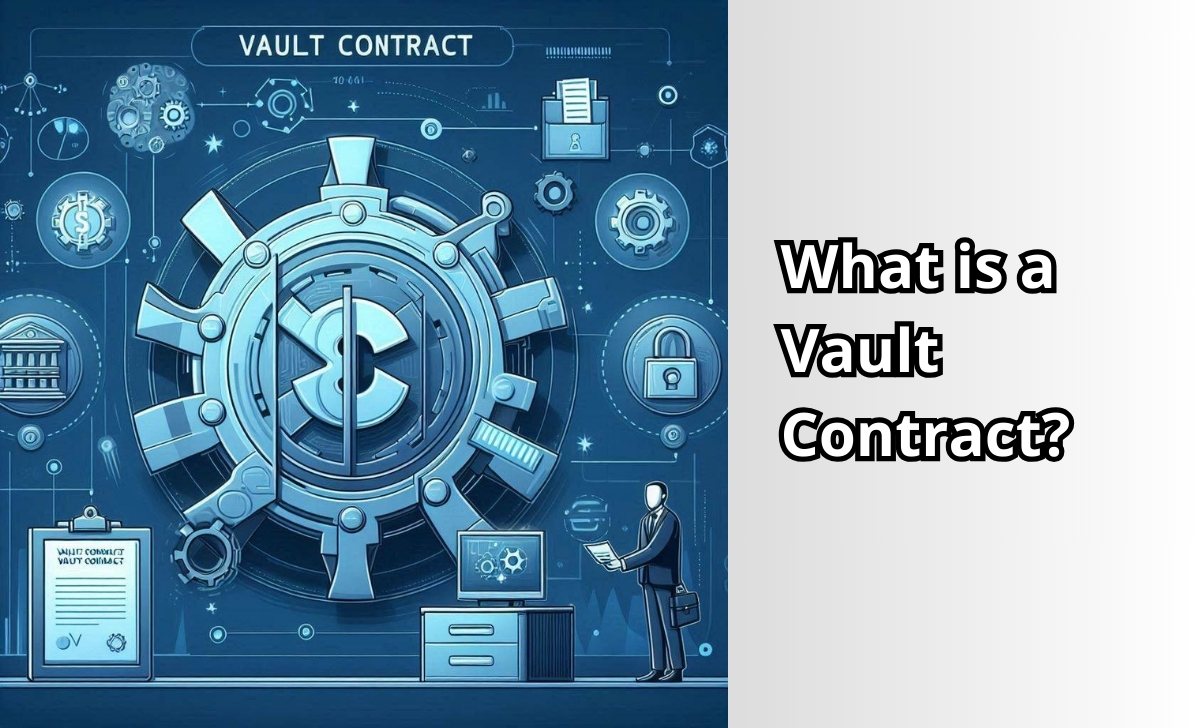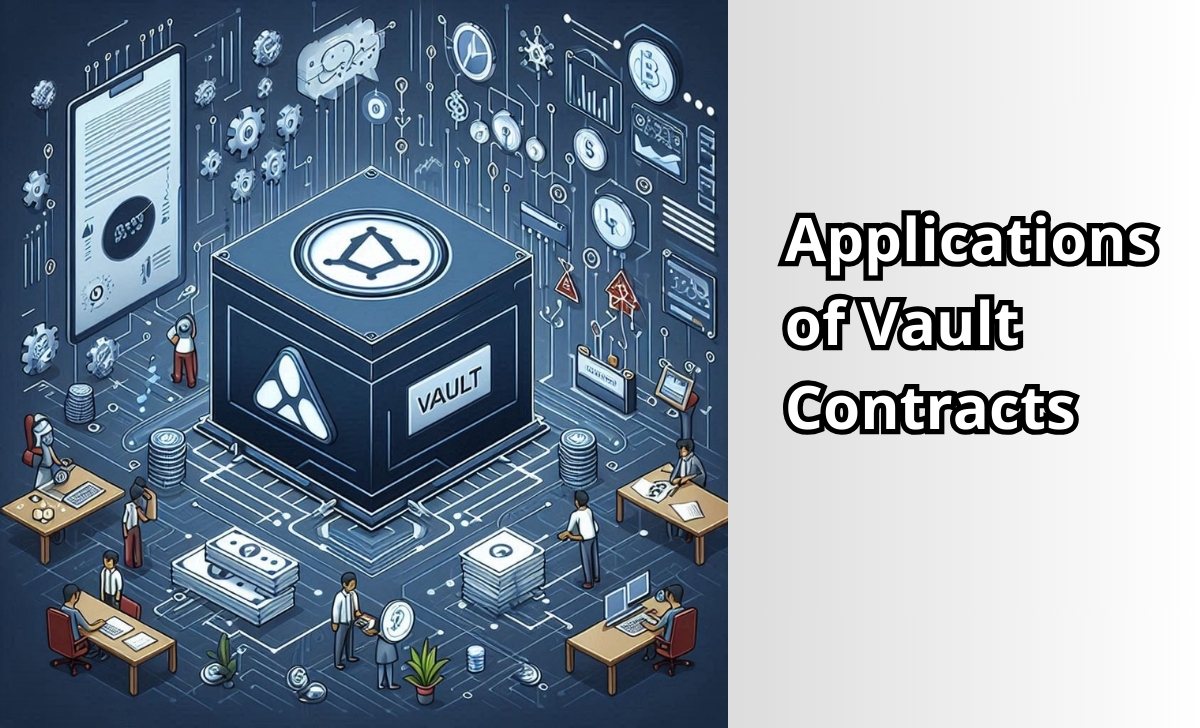The Vault Contract is a powerful type of smart contract designed to manage and protect assets within the blockchain environment. With advanced automation and security features, the Vault Contract is increasingly becoming an essential tool in decentralized financial systems and trading platforms.
In this article, AZCoin will explore the standout features of the Vault Contract and the benefits it brings to users.
What is a Vault Contract?

A Vault Contract is a type of smart contract designed to manage and protect assets in blockchain and decentralized finance (DeFi) systems. It is a tool that automates processes related to the storage, transfer, and protection of assets while providing effective security and asset management mechanisms.
Unlike simple smart contracts, Vault Contracts often include more complex features that allow users to set specific rules for asset management. It can be configured to perform automated tasks based on certain conditions, helping to minimize risks and enhance security.
Projects like StakeStone are also leveraging the power of Vault Contracts to improve the efficiency of asset management and protection in decentralized environments.
Key features of Vault Contracts
Vault Contracts stand out with several features:
- Automated Asset Management: Vault Contracts allow users to set up automated rules for asset management. This includes automatically transferring assets between addresses or executing transactions when a specific threshold is reached.
- Enhanced Security: Vault Contracts typically include robust security mechanisms to protect assets from risks. This may include the use of encryption, authentication mechanisms, and other protective methods to ensure that assets are not stolen or accessed without authorization.
- Risk Management: Vault Contracts provide tools for managing financial risks, such as setting limits and conditions to prevent potential losses.
- Monitoring and Reporting: Some Vault Contracts offer monitoring and reporting features, helping users track asset activities and receive detailed reports on transactions and asset statuses.
Benefits and limitations of Vault Contracts

Benefits
- Enhanced Security: Vault Contracts help protect assets by using advanced security mechanisms. This minimizes the risk of asset loss due to technical errors or fraudulent behavior.
- Risk Mitigation: By automating asset management processes and setting protective rules, Vault Contracts help reduce risks associated with asset management.
- Improved Efficiency: The automation features help reduce human intervention, thereby increasing efficiency in asset management and protection.
- Increased Transparency: Transactions and processes carried out by Vault Contracts are often recorded on the blockchain, ensuring transparency and auditability.
Limitations
- Technical Risks: Although Vault Contracts provide many security mechanisms, there is still a risk of technical errors or security vulnerabilities, especially if the contract is not properly programmed.
- Deployment Challenges: Setting up and deploying a Vault Contract can be complex and requires expertise in blockchain technology and smart contract programming.
- Legal Issues: Due to the novel and complex nature of Vault Contracts, there may be legal issues related to asset ownership and management.
Additionally, if you are an investor looking for a safe place to trade, check out our list of the best crypto exchanges 2024 that we have verified from multiple reputable sources.
Applications of Vault Contracts

Currently, Vault Contracts are applied in many fields, such as:
Decentralized Finance (DeFi)
- DeFi Fund Management: Vault Contracts are often used to manage funds in DeFi projects. These funds can include digital assets such as stablecoins, ERC-20 tokens, or other assets. Vault Contracts help automate the management and allocation of assets, optimizing returns and minimizing risks.
- Saving and Borrowing: In DeFi lending and borrowing platforms, Vault Contracts can be used to store collateral assets, automatically handle interest rates and payments, and ensure that loans are fully secured.
- Liquidity Provision: Liquidity platforms use Vault Contracts to manage liquidity pools. This helps maintain liquidity for trading pairs and optimize returns for liquidity providers.
Trading Platforms
- Personal Asset Management: In trading platforms, Vault Contracts can be used to safely store and manage user assets. This includes executing automated transactions according to predefined rules and protecting assets from threats.
- Automated Trading: Vault Contracts can be configured to execute automated trades based on specific market conditions. This helps optimize trading opportunities and minimize human intervention.
- Trade Fund Protection: Vault Contracts provide mechanisms to prevent the loss of trade funds due to technical errors or fraudulent behavior.
Investment Fund Management
- Automated Fund Management: In the field of investment funds, Vault Contracts can help automate the management and allocation of fund assets. Specific rules and conditions can be set to ensure that the fund is managed effectively and in line with investment goals.
- Reporting and Analysis: Vault Contracts provide detailed monitoring and reporting features on fund activities. This helps investors track fund performance and make smarter investment decisions.
Insurance and Risk Management
- Insurance Risk Management: Vault Contracts can be used in decentralized insurance platforms to manage and distribute insurance funds. This helps automate the insurance claim payment process and ensure that insurance funds are properly allocated.
- Risk Reserves: Financial institutions can use Vault Contracts to set up risk reserve funds, helping to protect investments and assets from unforeseen risks.
Personal and Business Asset Management
- Personal Asset Management: Vault Contracts provide secure and efficient management for personal assets, including digital and physical assets. Users can set up protective rules and automate transactions related to their assets.
- Business Asset Management: Businesses can use Vault Contracts to manage corporate assets, including cash, securities, and other assets. This helps enhance security and efficiency in managing business assets.
Community Fund Management
- Charity Fund Management: Charities and non-profit organizations can use Vault Contracts to manage charity funds. This includes automatically distributing funds to selected projects or organizations and tracking fund usage.
- Community Fund Management: Community projects or non-profit organizations can use Vault Contracts to manage community funds, ensuring that funds are used correctly and according to the rules.
The future of Vault Contracts
Vault Contracts are becoming an important part of developing financial and blockchain solutions. In the future, we can expect to see increased features and capabilities of Vault Contracts, including improvements in security, efficiency, and flexibility.
New projects and advanced technologies may continue to expand the potential of Vault Contracts, thereby bringing greater benefits to users and the blockchain community.
Conclusion
The above information provides a detailed overview of Vault Contracts that AZcoin has just shared with you. Hopefully, this article has given you a comprehensive understanding and can help you effectively apply this tool to protecting your assets!

I am Louis Dang, living in Ottawa, Canada. I am currently working as a trader for AZCoin company, with 7 years of experience in the cryptocurrency market, I hope to bring you useful information and knowledge about virtual currency investment.











